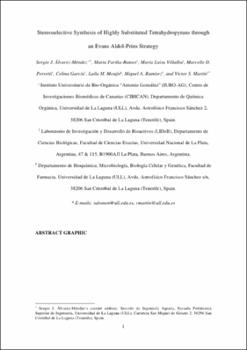Stereoselective Synthesis of Highly Substituted Tetrahydropyrans through an Evans Aldol-Prins Strategy
Abstract
A direct and general method for the synthesis of naturally occurring 2,3,4,5,6-pentasubstituted tetrahydropyrans has been developed, employing β,γ-unsaturated N-acyl oxazolidin-2-ones as key starting materials. The combination of the Evans aldol addition and the Prins cyclization allowed the diastereoselective and efficient generation of the desired oxacycles in two fashions: a one-pot Evans aldol–Prins protocol, in which five new σ bonds and five contiguous stereocenters were straightforwardly generated, and a two-step version, which additionally permitted the isolation of β,γ-unsaturated alcohol precursors bearing an N-acyl oxazolidin-2-one in the α position. From these alcohols were also obtained halogenated pentasubstituted tetrahydropyrans as well as 2,3,4,5-tetrasubstituted tetrahydrofurans, shedding light on the mechanism of the process. Computational studies were consistent with the experimental findings, and this innovative Evans aldol–Prins strategy was performed for the preparation of a battery of more than 30 densely substituted tetrahydropyrans, unprecedentedly fused to a 1,3-oxazinane-2,4-dione ring, both in a racemic fashion and in an enantiomeric fashion. These novel molecules were successfully submitted to several transformations to permit simple access to a variety of differently functionalized tetrahydropyrans. Most of these unique molecules were evaluated for their antimicrobial activity against Gram-positive and Gram-negative bacteria and the yeast Candida albicans, and some structure–activity relationships were established.






